
The Easybeats were an Australian rock band which formed in Sydney in late 1964. They are best known for their 1966 hit single "Friday on My Mind", which is regarded as the first Australian rock song to achieve international success; Rolling Stone described it as "the first international victory for Oz rock". One of the most popular and successful bands in the country, they were one of the few Australian bands of their time to foreground their original material; their first album Easy (1965) was one of the earliest Australian rock albums featuring all original songs.

John Inglis Young, OAM, known professionally as John Paul Young, is an Australian pop singer who is best known for having a worldwide hit with "Love Is in the Air" in 1978. His career was boosted by regular appearances as a performer and guest host on Countdown, a 1974–1987 TV series for Australia's national broadcaster ABC. Besides "Love Is in the Air", Young had top ten chart success in Germany and the Netherlands with "Standing in the Rain" and four other top ten hits in South Africa, including No. 1 hits with "I Hate the Music" in 1976 and "Yesterday's Hero" in 1975.

George Redburn Young was an Australian musician, songwriter and record producer. He was a founding member of the bands The Easybeats and Flash and the Pan, and was one-half of the songwriting and production duo Vanda & Young with his long-time musical collaborator Harry Vanda, with whom he co-wrote the international hits "Friday on My Mind" and "Love Is in the Air", the latter recorded by John Paul Young.
Flash and the Pan were an Australian new wave musical group. Also described as "a kind of post-disco, pre-house percussive dance music". It was formed in 1976 by Harry Vanda and George Young, both former members of the Easybeats, who formed a production and songwriting team known as Vanda & Young. The group's first chart success was their 1976 debut single, "Hey, St. Peter", which reached number five in the Australian Kent Music Report Singles Chart. The next single, "Down Among the Dead Men", peaked at number four in Australia in 1978. For international release, it was re-titled "And the Band Played On".

The Angels is the first album by Australian hard rock band, The Angels, which was released in August 1977. It was produced by Vanda & Young at Sydney's Albert Studios. It included a re-recorded version of their debut single, "Am I Ever Gonna See Your Face Again" and provided their second single, "You're a Lady Now", in July 1977. By the mid-1980s "Am I Ever Gonna See Your Face Again" had developed a cult status with the audience responding with "No way, get fucked, fuck off!"
"Keep On Smilin'" is a pop song written by George Young and Harry Vanda and recorded by Australian pop singer John Paul Young. The song was released in August 1976 as the second single from Young's second studio album, J.P.Y. (1976). The song peaked at number 15 on the Kent Music Report in Australia.

Mark Williams is a New Zealand singer with Recording Industry Association of New Zealand (RIANZ) number one hit singles, "Yesterday Was Just the Beginning of My Life" (1975) and a cover of Buddy Holly's "It Doesn't Matter Anymore" (1977) before he relocated to Australia later that year. His single, "Show No Mercy" (1990) was a top ten hit in both countries. He has undertaken extensive touring in support of numerous Australian bands and worked in television. In 2006 he became the vocalist for the reformed New Zealand band, Dragon.

Vanda & Young were an Australian songwriting and producing duo composed of Harry Vanda and George Young. They performed as members of 1960s Australian rock group the Easybeats where Vanda was their lead guitarist and backing singer and Young was their rhythm guitarist and backing singer. Vanda & Young co-wrote all of the Easybeats' later songs including their international hit "Friday on My Mind" and they produced themselves from 1967. Young was the older brother of Malcolm and Angus Young of the hard rock band AC/DC and younger brother of Alexander Young of the English band Grapefruit.
"I Wanna Do It With You" is a pop song written by George Young and Harry Vanda and recorded by Australian pop singer John Paul Young. The song was released in February 1977 as the lead single from Young's third studio album, Green (1977). The song peaked at number 7 on the Kent Music Report, becoming Young's 4th Australian top ten single.
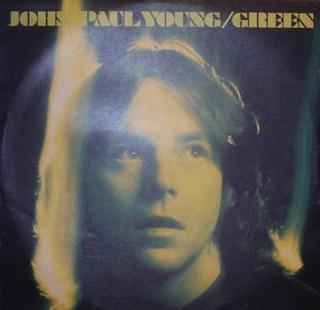
Green is the third studio album by Australian pop singer John Paul Young, released in April 1977. It peaked at number 19 on the Australian albums chart. The album was certified gold in Australia by the end of 1977.
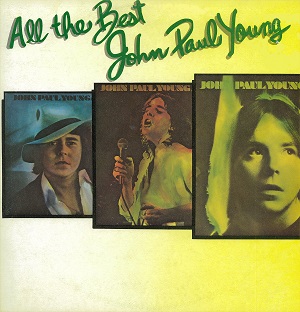
All the Best is the first compilation album by Australian pop singer John Paul Young. Released in November 1977, the album charted at number 40 on the Kent Music Report. The album includes songs from his three studio albums Hero, J.P.Y. and Green.

Hero is the debut studio album by Australian pop singer John Paul Young. The album was released in October 1975 and peaked at 9 and stayed in the charts for 20 weeks.
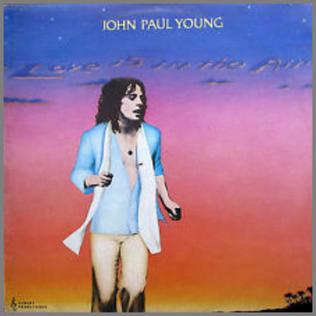
Love Is in the Air is the fourth studio album by Australian pop singer John Paul Young, released in 1978. The album was produced by Vanda & Young and released through Albert Productions. It peaked at number 32 in Australia. The album spawned the singles "Love Is in the Air", "The Day That My Heart Caught Fire", "Lost in Your Love" and "Fool in Love".

Heaven Sent is the fifth studio album by Australian pop singer John Paul Young, released in November 1979. The album was produced by Vanda & Young. It peaked at number 95 on the Australian Kent Music Report.

"Pasadena" is the debut single by Australian pop singer John Young, released in January 1972 and peaking at number 16 on the Australian Go-Set Chart.

"Yesterday's Hero" is a pop song by John Paul Young. The song was written by George Young and Harry Vanda and was released in February 1975 as the lead single from Young's debut studio album, Hero (1975).
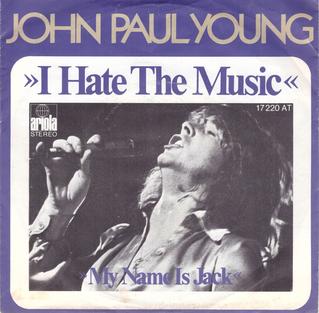
"I Hate the Music" is a pop song written by George Young and Harry Vanda and recorded by Australian pop singer John Paul Young. The song was released in March 1976 as the lead single from the singer's second studio album, J.P.Y. (1976). It peaked at number 2 on the Kent Music Report in Australia, remaining on the chart for 20 weeks. It was certified gold in Australia. It reached number 1 on the South African singles chart.

"Standing in the Rain" is a disco song recorded by Australian pop singer John Paul Young. It was released in Europe in February 1977 and in Australia in December 1977 as the third and final single from Young's third studio album, J.P.Y. (1976). The song was written by George Young and Harry Vanda.
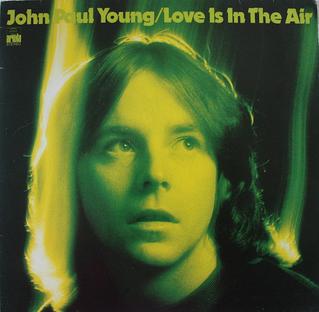
Love Is in the Air is a European only compilation album by Australian pop singer John Paul Young. The album was released in January 1978 to capitalise on the success of the song "Love Is in the Air", which was released in December 1977 and charted within the top 10 in Netherlands by January 1978. The album include songs from Young's three studio albums Hero, J.P.Y. and Green.
Ronald Robert Peel, who also performed as Rockwell T. James, was an Australian guitarist, singer and songwriter. He was a member of numerous bands starting with the Missing Links and the Pleazers in the mid-1960s; then the La De Da's from 1972 to 1975 and in various backing bands for John Paul Young. He released a solo album Shot of Rhythm and Blues in 1977 under the James pseudonym, which provided his only top 40 single, "Roxanne". He co-wrote "Rock Me Gently" for Sherbet with its band members, which is a top 10 hit for that group. Peel died in 2020 due to an unspecified cancer.
















